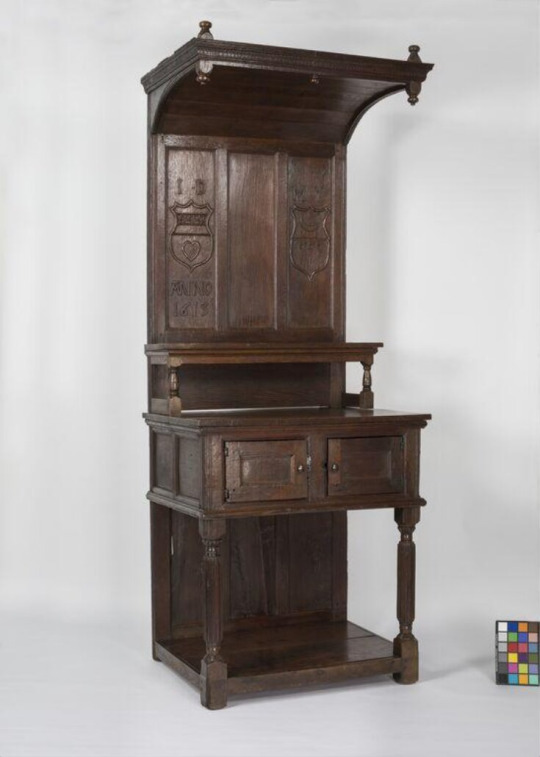#highland clearances
Text
My ancestors were victims of the Highland Clearances. Their land was stolen and they were forced out. It was a deliberate attempt at cultural genocide that led to worldwide Scottish diaspora. So few people, especially Americans, even know that these atrocities happened.
In my humble opinion, anybody of Celtic ancestry should be Palestine supporters by default. We went through this in the past. We can't sit back and watch it happen in real time to others.
81 notes
·
View notes
Text
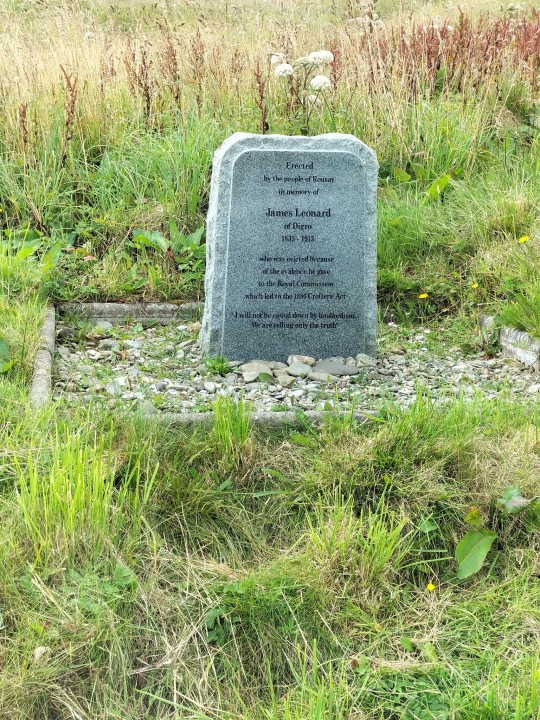
This is a memorial from Roussay on Orkney to James Leonard, an early tennant organiser. He was ultimately evicted from his land by the infamous landlord Frederick William Traill-Burroughs. Following his eviction, three of his children died of diphtheria. But his work in organising the tennants and giving evidence to the Scottish government ultimately got more protections for the crofters and may have helped prevent other clearances on Orkney.
Despite this he failed to win protection in time for the crofters of Roussay, and the island's population has gone from over 1000 at the time of the clearances to less than 100 today.
James Leonard's words still ring true today: "I am prepared to speak the truth and will not be cowed by landlordism" and "We are under the despotism and terror of the landlord and we want that removed ; even though I should fail in this battle, I will fight it out."
Today, James Leonard's farm stands derelict, and the land he rented unfarmed. Meanwhile, Burrough's grand house was gutted by a fire in the 1980s and also currently stands empty.
#uk politics#uk history#tennants#organising#highland clearances#Orkney#Scotland#social history#workers history
92 notes
·
View notes
Text
If u don’t want to agree to it being a colony then at least accept that they, along with the Irish and the Welsh were oppressed. If you don’t want to accept that then I don’t really know what to tell you becuase to me what im about to list right now seems an obvious example of oppression; trying to wipe out and I quote “ethnically cleanse” cultures, beating children for speaking Gaelic or Welsh right up until the late 20th century, after the battle of Culloden tartan and Gaelic was banned and if caught speaking Gaelic or wearing tartan, you were exiled, flogged or even executed, if you happened to have any ties with the Jacobites then you were literally rounded up and executed. Another example and a much more modern one is an account from my great grandma saying when she was at school you could be beat for speaking Gaelic and when my Nan was younger she was literally taught to “speak English” or more “proper”, meaning getting rid of the accent. Another example are the deep rooted stereotypes that still exist today about Scottish people, that all of them are “violent”, “angry”, “loud”, “drunk”, “savages”, “barbarians”, “not feminine” I could go on.. but these type of things are so common and they’ve been taught for so long that it is impossible not to think of the Scot’s like that and yes, some people may not be thinking of it as “not that deep” when in reality it is because they just aren’t funny and they make people look at us as if were some sort of joke, like our accents are always the butt of the joke or something. My mum has experienced things as simple as a dirty look whenever she gets a bit loud of says something in a strong accent and even on one occasion, an officer in the army telling my dad to “control his wife” after she refused to sing God save the King, as if she were “out of control” or something. All of these things are some sort of oppression and even though they aren’t as severe as they were before, they are still a thing.
I could go on about this topic for hours talking about other things like when talking about being Scottish, they always end up being the butt of the joke whether that be making fun of the accent, making fun of the bagpipes, the traditional dress. I live in England and I have a lot of friends who tend to do these things subconsciously and I wouldn’t hold it against them but I think it does need to be spoken about more and spoken about where it comes from and why it could be quite offensive. I’m so sorry to ramble on but a quick thing to point out is the fact that just becuase I want to spread the history of oppression of the Scot’s, it does not mean that I deny their involvement in the British colonialism of other countries and the involvement in the slave trade, i am aware it happened and are embarrassed and ashamed of the Scottish people who did that and I do consider them to be a “traitor” to Scotland but I just want to make my country’s history known and how they did suffer without people comparing or disregarding as something not that important or not as bad, yes some Scot’s did awful things and were involved willingly with British colonialism etc but it should not shrug off the suffering they went through as a country themselves.
I am sorry I couldn’t speak more for the Welsh or Irish but I didn’t want to then speak about their history and get it wrong. 🫶
#Celtic union#scotland forever#scottish independence#scotland#scottish#british empire#battle of culloden#jacobites#highland clearances#Celtic oppression#united ireland#welsh independence#union act of 1707#bonnie prince charlie#history#scottish history#amrev#american history
15 notes
·
View notes
Text

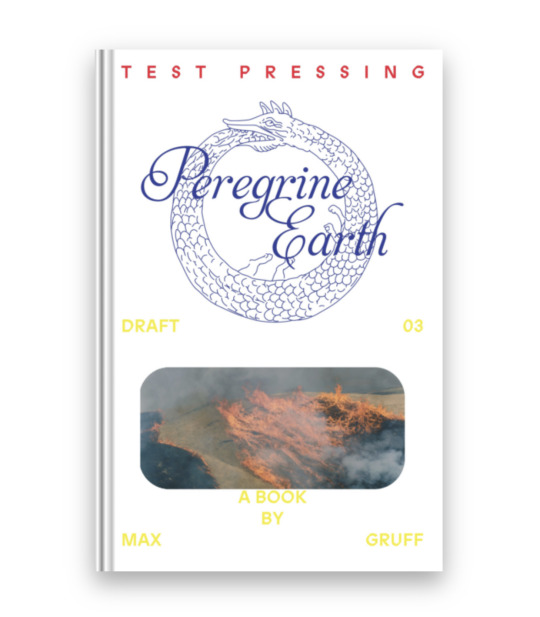
Test pressing of draft 3 on the way now.
#fiction#historical fiction#highland clearances#hebrides#literary#book extract#poetic prose#prose writing
2 notes
·
View notes
Text
16th April
Will Ye No Come Back Again? by Carolina Oliphaunt, Lady Nairne
On this day in 1746, the Jacobite Rebellion, led by Prince Charles Edward Stuart (“Bonnie Prince Charlie”) was finally defeated by the Hanoverian forces of King George II at the Battle of Culloden. The prince fled for France, deserting his largely Highland Scots army, never to return. Oliphaunt summons up the feelings of sorrow and loss the defeat of the Jacobite cause left in many of Charles’ followers.
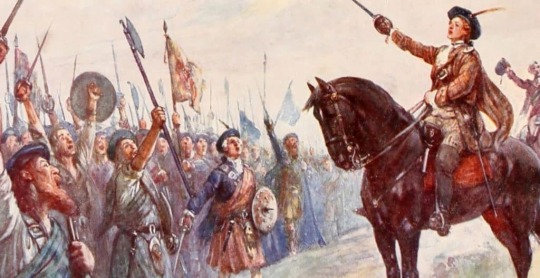
Source: Historic UK
Will Ye No Come Back Again?
Will ye no come back again?
Will ye no come back again?
Better lo’ed ye cannae be,
Will ye no come back again?
Bonnie Charlie’s now awa,
Safely owre the friendly main;
Mony a heart will break in twa,
Should he ne’er come back again.
Ye trusted in your Hieland men,
They trusted you, dear Charlie;
They kent you hiding in the Glen,
Your cleadin’ was but barely.
…
We watched thee in the gloaming hour,
We watched thee in the morning grey;
Tho’ thirty thousand pounds they’d gie,
Oh there is nane that wad betray.
…
Will ye no come back again?
Will ye no come back again?
Better lo’ed ye cannae be,
Will ye no come back again?
Despite the romanticism surrounding Charles’ doomed attempt to restore the Stuarts to the throne of the United Kingdom, the defeat of the rebellion was disastrous for the Highlanders, leading directly to the Highland Clearances and the destruction of an entire way of life.
2 notes
·
View notes
Text
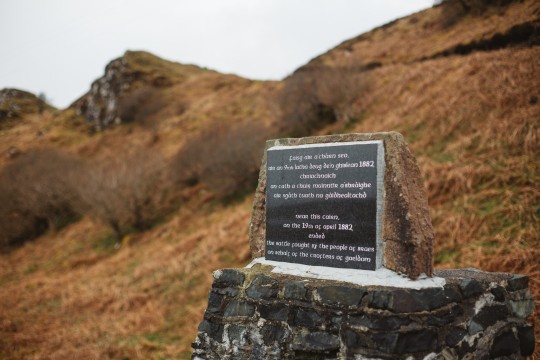
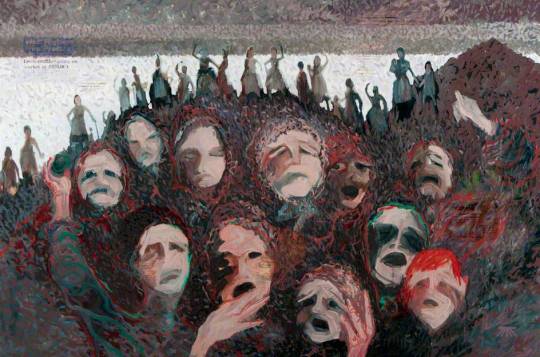
April 11th 1882 we saw an incident during the Highland Clearances happened on Skye that has become known as The Battle of the Braes.
Lord MacDonald sought help from the law to evict the stubborn crofters, and in April 1882 the locals woke to the sight of a sheriff officer. Charged with issuing eviction notices, the sheriff was met with an angry reaction and forced to burn the notices.
Following this initial confrontation, reinforcements were requested from Glasgow. 50 police officers travelled to Skye with the intention of evicting the crofters, who once again stood their ground.
Arriving at Braes, the police were faced down by a mob of around 100 men, woman and children from the local community, many of whom were armed with an array of primitive weapons. Wielding clubs, sticks and stones, the Battle of the Braes erupted and the crofters clashed with the police.
Several people were injured in the Battle of the Braes while others were arrested and subsequently fined for their involvement. Despite the outcome, the crofters still stood firm in their refusals and military intervention was considered.
The Battle of the Braes sparked similar unrest elsewhere in Skye, with locals in Glendale incensed at the treatment of other islanders.
Notably, the incident prompted a public outcry. Sympathetic press coverage of the dispute galvanised widespread support for the crofters. Sensing the mood, the government refused to authorise military intervention and a commission was launched to examine the plight of the crofters.
The Napier Commission, chaired by Lord Francis Napier, ultimately led to the introduction of new legislation aimed at improving security for crofters via the Crofters Act of 1886.
The Act was modelled largely on the Irish Land Acts of 1870 and 1881 and granted crofters security of tenure.
Today, the Battle of the Braes is a celebrated event in both the history of Skye and broader Scottish history. A monument commemorates the efforts of the crofters while a popular folk song also celebrates the event.
23 notes
·
View notes
Text
Reading Bed Me, Duke by Felicity Niven and I've never read a heroine more down and ready in the first chapter (I have a newfound appreciation for authors setting the first chapter in the "thick" of action so to speak, and then the next is like "three weeks earlier....").

#a humanitarian#no for real she's gonna stop the highland clearances by seducing a duke#felicity niven#historical romance
15 notes
·
View notes
Text
As the Subaru approaches closer and closer to 200k miles and it is getting more and more rattly. I'm considering my next vehicle.
So help me god it might be a mini van. I might be THAT dog person.
#toyota sienna vs toyota highlander#cause to be realistic i may need to fit in mutiple dog crates people and gear into a vehicle#considering for when i get a puppy in 2025 (its going to happen dammit)#both sienna and highlander have hybrid AWD options#they both get the same gas mileage and their price is comparable#highlander has ground clearance and the sienna just has more room in general#but seriously trying to imagine myself in a mini van#😑#partner's next vehicle most likely will be an off roading capable vehicle so we will jave that covered#but still
8 notes
·
View notes
Note
the highland clearances were a genocide against gaelic highlanders by germanic-speaking lowlanders, who they called the "eirse", or irish; meanwhile they, that being lowlanders, took to calling themselves "scots", previously being known as the "ingles" (english). the clearances were instantiated, substantiated, and eventually concluded almost entirely within scotland without oversight from or interest within england, instead being focalised within edinburgh, aberdeen, glasgow, and other sites of scottish capital and burgeoning industry; they were a distinctly scottish, not british, adventure, and carried on the legacy of various other genocides against gaelic peoples (including the plantations of ulster and the great hunger) carried out partly by lowland scots, which were jointly carried out with english assistance and participation even prior to the act of union. as another descendant of clearance survivors (& the irish famine), this is a really careless comparison, and it's with sympathy as another member of the diaspora that i ask you to rethink the narrative you're reproducing here surrounding the genocide, because in this analogy it's not "scots" who are the palestinians.
Ignoring England's role in the attempts at cultural genocide against different groups of Celtic peoples, especially after the unification of the crowns, is a bit foolish. The Lowland Scots who instigated the Highland Clearances were more aligned with England's interests and saw the traditional way of life of the Highlanders as being against the interests of Britain as an entity, not to mention as a colonial power. To try and claim that the Clearances were completely a Scottish operation, i.e. Scots inflicting harm on themselves, is within error.
I also wasn't attempting to infer that the situations that Scottish Higlanders faced were identical to what Palestinians are experiencing now. Every attempt at oppression and eradiation of "others" has its own horrible, unique historical trajectory. My simple point was that tens of thousands - if not more - Scottish Highlanders were forced from their land, had aspects of their culture banned and suppressed, were forced to emigrate, and yes, many more were killed for resisting. The emptiness of the Scottish Highlands today and the low numbers of Gàidhlig speakers is a cruel reminder of what happened.
Both the Highland Clearances and the Irish Potato Famine are absolute blights on human history that were a product of pro-Union British and yes, Capitalistic interests. All Celtic peoples but especially the Gaels have been fighting against oppression in various forms for nearly 2,000 years, from the occupation by the Roman Empire up until now. Is it any real stretch of the imagination then that Scottish and Irish people would care about what's happening to Palestinians? I think not. Saying "they get it" doesn't mean they went through the exact same thing. It means there is a shared history of those in power trying to neutralize and then eradicate them.
5 notes
·
View notes
Text
i was not expecting the modern history of scotland in ep 4 of andor
12 notes
·
View notes
Text
lovinggg this show…… it’s barely even star wars, thus far it’s far more a thoughtful exploration of imperialism and fascism than sci fi. it’s technically all fiction but sometimes barely, you know? i don’t think the veil between our world and the star wars-verse has ever been portrayed as so thin.
#not that i had my doubts but. you know#the new disney plus star wars show. maybe a few#filming it in the highlands and talking about the clearances !!! they really did that
8 notes
·
View notes
Text

Book I’m working on.
#graphic design#book design#book cover#writersofinstagram#author#highland clearance#historical fiction#graphics#visual communication
4 notes
·
View notes
Text
Seeds of barley,
scattered on barren winds,
no longer bound to clan and kin.
Lost youth and wasted age,
stripped and broken like rusted tin.
Mournful stone and empty doors,
the howling wind and Atlantic roar,
cannot drown the quiet sounds -
a resurgence from the richer ground.
The far side of the world no longer alone;
The Children of the Barley are returning home.
This is an ode to the lives lost in the highland clearances and the resurgence of Scottish culture after centuries of London-led Anglicanization. My short story 'The Sellar Winds' is also about this topic, but you can find more comprehensive information here.
20 notes
·
View notes
Text
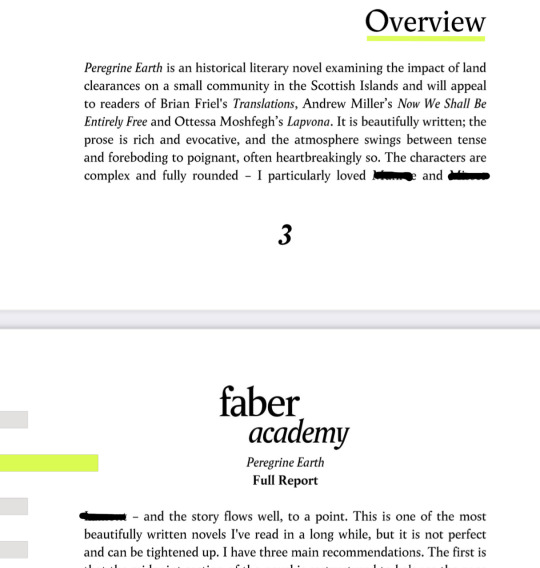

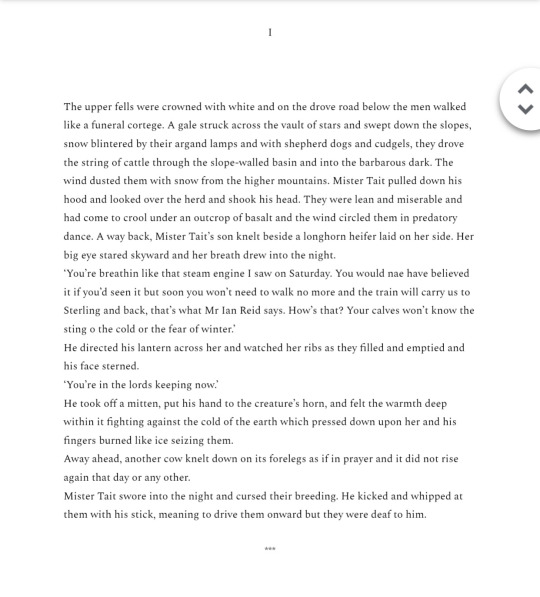
I’ve been writing a book for 4 years set during the highland clearances. I sent it to faber to be evaluated. It’s apparently good. I just wanted to put this somewhere because it’s the biggest undertaking I’ve ever done so far. Sorry it’s not art.
#highland clearances#faber and faber#authors on tumblr#literature#historical fiction#booksbooksbooks#literary#scotland
2 notes
·
View notes
Text
anyway the thing about andor is that it is very clearly drawing directly from real life colonial history
#the people on ferris clattering metal like the women of the bogside#the highland clearances#etc etc
6 notes
·
View notes
